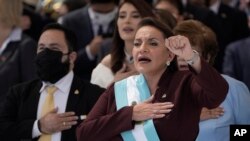Xiomara Castro was sworn in as the first female president of Honduras on Thursday, a ceremony witnessed by thousands of people amid a sea of waving flags in the national stadium in the country's capital, Tegucigalpa.
Castro immediately faces multiple challenges: high unemployment, persistent violence, corruption, and troubled health care and educational systems, along with pressure from the United States to make life better for Hondurans in order to curb their desire to make the long overland trek north through Mexico to try to migrate to the United States.
U.S. Vice President Kamala Harris, tasked by President Joe Biden to mitigate the root causes of migration to the U.S. from the Central American nations of Honduras, Guatemala and El Salvador, attended the inauguration and met with Castro afterward.
They discussed "the root causes of migration, combating corruption and expanding economic opportunity," according to a statement from Harris' office.
"Vice President Harris welcomed President Castro's focus on countering corruption and impunity, including her intent to request the assistance of the United Nations in establishing an international anti-corruption commission and commitment to advancing necessary legislative reforms to enable such a commission to succeed," the statement said.
Chief among the concerns of many in the region are crime, poverty and official corruption, which have led thousands over recent years to decide that the dangerous trip north and the uncertainty of getting into the U.S. are, nonetheless, worth the risk.
Castro has said she plans to formally invite the United Nations to set up an anti-corruption mission in Honduras.
The U.S., looking to gain an ally in the region, has strongly supported Castro.
Biden pledged to adopt a more humane stance on migration than that of his immediate predecessor, Donald Trump, who sent migrants back to their home countries and separated children from their families.
But Biden's eased migration policies have led thousands in Central America to view it as an invitation to migrate to the U.S., although the outcome once they reach the U.S.-Mexican border is uncertain.
Castro won on her third try for the presidency. She was previously first lady during the presidency of her husband, Manuel Zelaya, who was deposed in a military coup in 2009.
Some information for this report came from The Associated Press.








